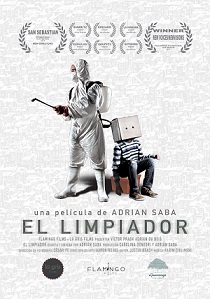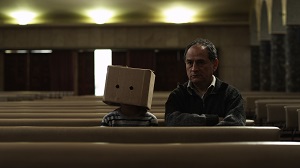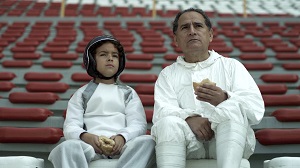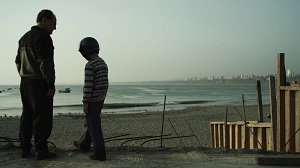 The story of a middle aged recluse stumbling upon a newly-orphaned youngster, as well as that man’s long-since discarded humanity, The Cleaner (originally released in Peru as El Limpiador) is a beautiful, touching, intelligent, and surprisingly moving film. Victor Prada plays Eusebio, a lonely bachelor who works for the Peruvian Health Department as some kind of biohazard cleanup agent. Since a highly contagious, fast-moving pulmonary plague is decimating the population of Lima as the film opens, the audience quickly sees that Eusebio keeps active.
The story of a middle aged recluse stumbling upon a newly-orphaned youngster, as well as that man’s long-since discarded humanity, The Cleaner (originally released in Peru as El Limpiador) is a beautiful, touching, intelligent, and surprisingly moving film. Victor Prada plays Eusebio, a lonely bachelor who works for the Peruvian Health Department as some kind of biohazard cleanup agent. Since a highly contagious, fast-moving pulmonary plague is decimating the population of Lima as the film opens, the audience quickly sees that Eusebio keeps active.
Like, really active.
Yet it’s within these first few minutes that director Adrian Saba shows how he is going to handle this story, for there is very little dialogue, yet a wealth of information about what’s going on and who this “Cleaner” person is. Although the film does slyly explain that a devastating epidemic is responsible for the deaths of countless thousands, what’s interesting is how nonchalant Eusebio acts when flipping through his television’s channels, which fade in and out as the remote control clicks past each news report with seemingly little interest. When Eusebio finally lands on a tennis match, one gets the sense that he ultimately decides on that not because he’s interested in the game, but because it is something, anything, other than the avalanche of bad news suffocating the city and his existence.
 Lost in a seemingly endless series of calls to sanitize contamination sites, Eusebio finds his world turned upside-down when he discovers a young boy hiding inside the house of one of his clean-ups. The boy is Joaquin (Adrian Du Bois), and his appearance is something Eusebio clearly isn’t prepared to deal with. Eusebio hauls Joaquin to his employer’s government office like some sort of lost puppy, leading the kid around by the scruff of the sweater, only to learn that Lima’s orphanages are full. Unable to do anything with the kid short of abandoning him, Eusebio reluctantly takes Joaquin in, hoping that a relative will turn up after a few days of searching.
Lost in a seemingly endless series of calls to sanitize contamination sites, Eusebio finds his world turned upside-down when he discovers a young boy hiding inside the house of one of his clean-ups. The boy is Joaquin (Adrian Du Bois), and his appearance is something Eusebio clearly isn’t prepared to deal with. Eusebio hauls Joaquin to his employer’s government office like some sort of lost puppy, leading the kid around by the scruff of the sweater, only to learn that Lima’s orphanages are full. Unable to do anything with the kid short of abandoning him, Eusebio reluctantly takes Joaquin in, hoping that a relative will turn up after a few days of searching.
Yet a funny thing happens after a little time with the kid: Eusebio begins to care for the boy. Understandably terrified by what is going on, Joaquin literally locks himself away in Eusebio’s apartment out of fear of the plague, something that leads to a tender turning point for the cleaner that this reviewer won’t ruin. It should suffice to say that Eusebio’s encouragement of Joaquin to come out of his shell leads to a similar transformation in the aging hermit. Seemingly small acts like the selection of a new sweater for Joaquin, and a visit to see his senile father all hint at a change going on inside Eusebio, whose affection for the orphaned child in his care has clearly awoken something inside the man.
 Adrian Saba didn’t just direct The Cleaner, he wrote it as well: something that these finer nuances and smaller details speak to. What’s more, the cinematography and shot selections are inspired, and augment both the practical aspects of the plot, but also its spiritual components as well. Mired in a devastating plague, the city of Lima is shown to be mostly deserted, something that dresses the narrative in such a way as to bring the audience into Eusebio’s world. This is clearly a lonely man, and not just because of the plague; yet when Joaquin enters Eusebio’s life, and the cleaner opens up to the boy, a world with faded, muted colors seems to exhale and spew forth a new palate of vibrant undertones anchored in yellow and gold.
Adrian Saba didn’t just direct The Cleaner, he wrote it as well: something that these finer nuances and smaller details speak to. What’s more, the cinematography and shot selections are inspired, and augment both the practical aspects of the plot, but also its spiritual components as well. Mired in a devastating plague, the city of Lima is shown to be mostly deserted, something that dresses the narrative in such a way as to bring the audience into Eusebio’s world. This is clearly a lonely man, and not just because of the plague; yet when Joaquin enters Eusebio’s life, and the cleaner opens up to the boy, a world with faded, muted colors seems to exhale and spew forth a new palate of vibrant undertones anchored in yellow and gold.
While Eusebio and Joaquin still wander a mostly deserted world, their journeys seem full of vibrancy and promise: the landscapes around them a reflection of this developing bond. The Cleaner walks a very delicate line, for if the dialogue had been too heavy, and the characters had simply talked-out all their changes and revelations, it might come across as cheap. On the flip-side of things, had director Adrian Saba simply told the story of a lonely man meeting a deserted nine year old in the midst of a plague, it would have been an interesting day-in-the-life flick, and nothing more.
 Instead, The Cleaner manages to have its cake and eat it too, for while significant change and character development do occur throughout the course of this film, it is accomplished by the perfect marriage of thoughtful cinematography, deliberate shot selection, and nuanced acting. Taken as a whole, the film is a very small, isolated little story, yet it’s constructed in such a measured way that it has the feeling of a ship in a bottle. Indeed: every scene of this movie feels like it was carefully put in place by a pair of tweezers.
Instead, The Cleaner manages to have its cake and eat it too, for while significant change and character development do occur throughout the course of this film, it is accomplished by the perfect marriage of thoughtful cinematography, deliberate shot selection, and nuanced acting. Taken as a whole, the film is a very small, isolated little story, yet it’s constructed in such a measured way that it has the feeling of a ship in a bottle. Indeed: every scene of this movie feels like it was carefully put in place by a pair of tweezers.
Were this one any longer than the brisk ninety minutes it is, The Cleaner might have begun to drag, yet as it stands, the picture feels perfectly paced. Playing at this year’s Seattle International Film Festival, this would be a great film for a rainy day, when one is in the mood to get lost in the life of somebody living on the other side of the world. Also, coming out of a film that’s all about some killer disease ravaging a helpless population, one can’t help but to feel better about any day: rainy or otherwise.





{ 2 comments }
The theme, old man finds kid, doesn’t like it, but grows to love it, is stolen from a Tchech movie Kolja by Jan Sverak, which won an Academy Award. I would expect film critics to notice that. 😉
Geraldine –
The tone, structure, and plot-particulars of this movie vary wildly from Kolya. Except for the basic similarities, I wouldn’t say this movie is “stolen” from Kolya any more than The Hurricane is a rip-off of The Shawshank Redemption. Just sayin’…
Comments on this entry are closed.